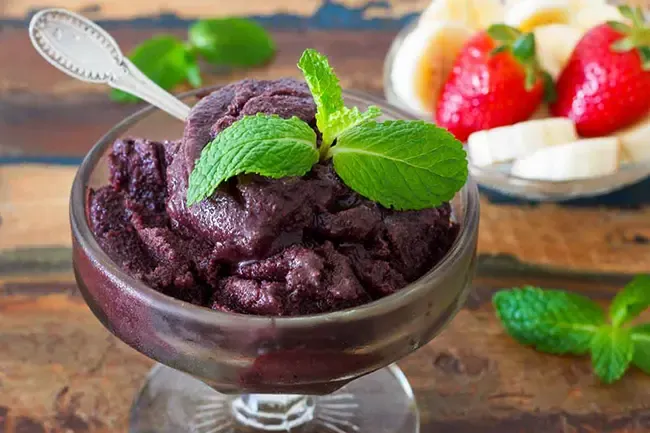As pet owners, we love giving our dogs the best snacks. Many people want to share healthy foods with their pets. Superfoods like acai berries are very popular these days.
But before you let your dog taste acai, you should ask: Can dogs have acai? This is more than just a fun thought—it is about your dog’s safety.
In this article, we will talk about acai, what it does, and if it is safe for your dog. We want you to know the facts before giving new foods to your best friend.
Let’s learn together and help you make a smart choice for your furry companion!
Is Acai Safe for Dogs?
Acai berries are known as a "superfood" for people. But when it comes to dogs, things are not so simple. You may enjoy acai in your smoothie or on a fancy breakfast bowl, yet it's not a safe choice for your furry friend. According to the American Kennel Club, you should avoid giving acai to your dog.
Why Is Acai Berry Bad For Dogs?
The main reason acai can be harmful is that it contains a substance called theobromine. This is the same compound found in chocolate, which you may know is unsafe for dogs. Even a small amount can make dogs sick. Signs of theobromine poisoning include vomiting, diarrhea, restlessness, and even seizures.
Acai berries may also have extra sugar or added sweeteners if they are in powders, juices, or snacks. These ingredients are not healthy for dogs and can cause upset stomach or lead to obesity.
4 Health Benefits of Acai Berries for Dogs
Acai has developed a reputation as a superfood, offering many potential benefits for humans and pets.
Antioxidants: Acai contains large amounts of antioxidants, which can help reduce the damage from free radicals and improve your dog’s immune system. Acai can contain as much vitamin C as blueberries. It also contains vitamin A and E. Each of these has antioxidant properties.
Anthocyanins: These are flavonoids that help give berries like blackberries, cranberries, and raspberries their rich color. They appear to have anti-inflammatory properties, which can help dogs with arthritis. Anthocyanins can help neutralize superoxides, sometimes produced when dogs are under stress.
Calcium: Acai contains high amounts of calcium, which helps fortify skeletal, nervous, and muscular systems.
Omega-3 fatty acids: Famously found in fish, omega-3 fatty acids can benefit your dog’s health. Omega-3s may help prevent cardiovascular diseases, boost kidney health, and improve your dog’s skin and coat health.
Can Dogs Be Allergic to Acai?
Some dogs exhibit allergies to acai. Anytime you give your dog food they’ve never eaten before, monitor how they react, especially if it’s a new human food not specially formulated for pets. Acai contains ficin and ficusin, both of which can cause allergic reactions. Consult a vet to get the best advice for your dog’s diet.
Read More: Can dogs have acai?
Before Sharing With Your Pooch
Certain human foods can cause adverse reactions in canines, so always consult your veterinarian to determine whether it is safe to add these foods to your pet’s diet. This article is for educational and informational purposes and is not a substitute for medical or dietary advice.
What Should I Do If My Dog Ate Acai Berry?
Similar to chocolate, your dog’s consumption of acai berry is a reasonable cause for concern. However, it’s nothing that your veterinarian can’t handle with a prompt response on your part. If there’s a chance of toxicity, be proactive.
Let’s say, though, that you’re unaware if your dog consumed this berry, but you’ve noticed concerning behavior from your dog. Symptoms such as excessive panting, muscle twitching, and vomiting, are all early signs of poisoning and can appear within two hours.
If these signs show themselves, seek veterinary care promptly.
That being said, don’t consider your pup safe after two hours. Research regarding theobromine states that dogs’ bodies metabolize it slowly dogs. This means that symptoms may take up to 24 hours to appear, and recovery may take up to three days.
Were you aware that acai berry contained theobromine, same as chocolate? Has your dog ever accidentally eaten some? Let us know in the comments below.
Can Dogs Eat Acai Bowls
Now let’s look closer at some acai products that we love to eat and whether they are safe for dogs.
Acai bowls are usually made with a lot of different types of fruit, including acai. Large amounts of these bowls are bad for your furry companion.
If the acai bowls contain artificial sweeteners you should definitely keep them away from your dog.
Acai pulp might be ok in tiny amounts, but it’s best to keep it away from your dog.
Can Dogs Eat Acai Sorbet
Another one of the most popular food products with acai is colorful sorbet. While small amounts might be ok, the danger outweighs the potential benefits. It’s so high in sugar that it could lead to weight gain and heart disease.
Can Dogs Eat Acai Smoothie
No, dogs should not eat an acai smoothie. This is not the best way to share a nutritious snack with them.
If you still want to give your dog a little bit of your smoothie, treat it like you do other new foods. Watch for signs of allergic reactions and only give them a tiny bit at a time.
It’s just not a good idea to give your dog human foods that are high in sugar, like acai juice. It could lead to weight gain, cardiovascular disease, and diabetes.
Can Dogs Eat Acai Powder
People like to use acai powder in smoothies and to give themselves a boost of nutrition, but don’t add it to your dog’s dog food.
Even though a tiny amount may not harm your pet, adding acai powder to healthy snacks is not a good idea for dogs.
Even small quantities might give them an upset stomach.
Final Thoughts
The short answer is that acai isn’t a good idea for dogs, even as an occasional treat.
It’s best not to give your dog acai berries.























